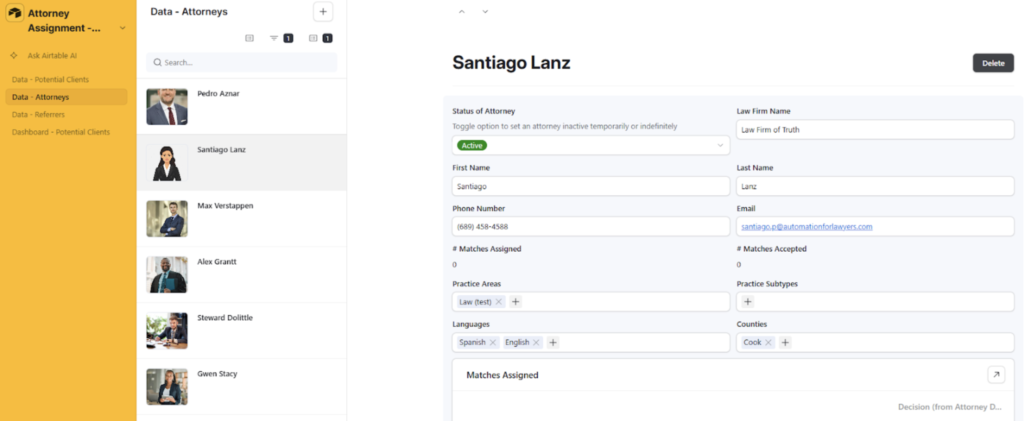Building an Automated Legal Referral System
The “Justice Entrepreneurs Project” Airtable Transformation
“Working with Swans has helped me feel less afraid of technology.
Now I can see the actual results of how automation can take your organization to the next level and really improve your role and the time you spend on your work.”

Samoane Williams
Director of the Justice Entrepreneurs Project at the Chicago Bar Foundation
Firm Profile
The Justice Entrepreneurs Project (JEP) at the Chicago Bar Foundation was created with a crucial mission: helping lawyers establish and maintain practices that serve everyday people. Under the leadership of Samoane Williams, who joined as Director in 2020, the program addresses a critical gap in legal services – supporting middle-class individuals who earn too much to qualify for legal aid but cannot afford traditional legal services.
The Challenge: Managing Growth While Maintaining Quality
As the only full-time staff member working with two part-time supporters, Samoane faced mounting pressure from the program’s success. The JEP received referrals through multiple channels – legal aid organizations, phone calls, and online forms – creating an overwhelming administrative burden. “The referrals were becoming too much to handle for one full-time staff person,” Samoane explains. This volume not only strained resources but also threatened the program’s ability to model excellent client service to participating attorneys.
- Multiple referral sources created a fragmented intake process
- Manual handling of referrals consumed valuable staff time
- The existing system couldn't scale with the program's growth
- Their current system was scheduled for discontinuation at the end of 2024
The situation was particularly challenging because:
Samoane Williams
Firm
The Chicago Bar Foundation
Project
The “Justice Entrepreneurs Project”
Firm Size
11-20
Based in
Illinois
The Solution: A Comprehensive Digital Transformation
Swans revolutionized the JEP’s referral system by implementing a sophisticated yet user-friendly solution built on Airtable, a powerful cloud collaboration platform that combines the simplicity of a spreadsheet with the power of a database. This new system transformed their referral management process from end to end.
The foundation of the system lies in streamlined data collection through customized web forms integrated directly into the JEP’s website. These forms capture all necessary information from potential clients seeking legal services. Additionally, staff members use the same standardized forms when taking referrals over the phone, ensuring consistent data collection regardless of the entry point. This unified approach means every referral enters the system immediately and triggers the automated matching process.

This screenshot shows the attorney management interface of the JEP portal, which captures comprehensive details for each participating lawyer. The system displays key information including the attorney’s active status, contact details, and importantly, their practice metrics such as the number of matches assigned (22) and accepted (20). Each attorney’s profile can also be customized with language capabilities and geographic coverage across specific counties. All these parameters are easily adjustable using a clean, intuitive interface, ensuring the referral matching system always works with up-to-date information to make optimal client-attorney matches.
To ensure timely client service, the system also includes automated notification workflows that alert attorneys of new referrals and require active acceptance. If an attorney doesn’t respond within five days or declines a referral, the system automatically reassigns the case to another qualified attorney, ensuring no client falls through the cracks.
The entire solution was designed with user experience in mind, requiring no technical expertise to operate and no extra logins for the participating attorneys to remember. In this sense, staff can easily monitor the status of all referrals through a simple interface, while attorneys receive clear notifications as soon as a new referral is submitted.
The solution then centers around a dynamic referral distribution system that intelligently matches clients with attorneys based on multiple criteria. The team developed complex automation rules that consider:
- Practice area expertise
- Geographic location
- A fair and balanced distribution of referrals
- Attorney availability and response times
The implementation of Swans’ solution has delivered significant improvements across multiple areas:
Results: Efficiency, Growth, and Enhanced Service Delivery
Operational Efficiency
- Automated referral processing has freed up substantial staff time
- The new system effectively operates as "another part-time person"
- Staff can focus on strategic initiatives rather than manual processes
- Response times have improved significantly
Enhanced Service Delivery
- Clients can now connect directly with attorneys without staff intervention
- The program can now serve more people in the Chicago community
- Improved service delivery has enhanced the organization's profile
- Better client experience leads to increased referrals and community trust
Future Growth

Samoane sees the new system as a cornerstone for future expansion: “This new referral intake process will allow us to reach more people in our community, serve more people, and elevate our profile in the broader Chicago community.”
The transformation has not only improved current operations but has also positioned the Justice Entrepreneurs Project for sustainable growth. By implementing a scalable, user-friendly system, the Chicago Bar Foundation can continue its mission of making legal services accessible while serving as a model for other legal incubator programs across the country.
“The new system effectively operates as another part-time person”

Samoane Williams
Director of the Justice Entrepreneurs Project at the Chicago Bar Foundation
